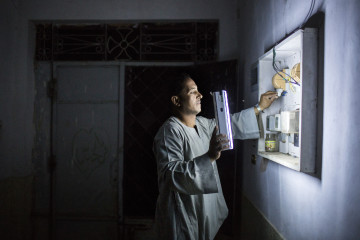

Aladdin Hamza, a retired electric engineer living in Cairo’s Shoubra suburb, wondered how a retiree with a fixed pension could possibly afford the recent surge in electricity prices.
“I just don’t get it,” the 64-year-old asked. “How can families, such as mine, keep up with the almost periodical, sharp increases while the breadwinner’s salaries remain almost unchanged?”
In August, an anonymous source from the Egyptian Ministry of Electricity reported that the average electricity bill for the industrial sector at medium voltage usage has increased by 40 percent.
Household electricity prices, on the other hand, have increased by varying amounts ranging from 14.5 to 50 percent, depending on consumption.
The latest round of price hikes has been already in effect in households registered to a prepaid meter system, which allows consumers to pay for electricity before they use it and will take effect for regular meters on October 1.
Another source from the ministry noted that the new quotas are divided into six brackets. The first bracket covers between 0 and 50 kWh with a rate of $0.014 per kWh, and the highest bracket covers consumption exceeding 1,000 kWh for $0.048 per kWh.
The New Arab reached out to the Ministry of Electricity’s spokesperson office for a comment on the reason behind price hikes but received no reply.
'Unfair and wrong'
According to Salma Hussein, an Egyptian researcher and economist, when electricity prices increase, high-income households will still “turn on the pool filter,” but low and middle-income families will unplug essential devices and turn on fewer lights.
“Because they can not stop paying rent or taking the metro to work, this is all they can do,” she told The New Arab.
According to Salma, the Egyptian government attributes the recent hikes to the rising global cost of energy and an effort to recover costs, in line with the $8 billion loan agreement the North African country made with the International Monetary Fund (IMF), which includes reducing subsidies on energy as part of its economic reform plan.
However, while the new price hikes and reduced subsidies apply to both the industrial sector and households, the latter receives substantial financial aid.
Moreover, many government organisations and public companies do not pay their bills, which could lead to arrears causing a financial shortfall that demands increased electricity prices, she further explained.
“It is unfair and wrong that everyday people have to pay more,” Salma told The New Arab. “They are also consistently blamed and asked to turn off their ACs and moderate their usage.”
'I can't cut back on electricity'
“The last electricity price hikes affected my home budget a lot,” Aladdin told The New Arab. He used to pay $12.38 a month for electricity, a number that has quadrupled since, reaching $53.66, forcing his family to cut back on other expenses to afford electricity.
Layla Hassan, a 55-year-old stay-at-home mother who lives in Sheikh Zayed in the Giza Governorate, revealed that she used to pay $10.32 for all bills — electricity, water, and gas — but now she pays $20.64 just for electricity.
“We did not even change anything in our consumption or buy any new devices, and I can not cut back on electricity usage because it is all essential,” she said, referring to her running fridge, TV, lights, and fan to combat the heat.
However, Layla admitted to having to cut back on foods, that have also become hefty in price, such as meat, chicken, and fruits.
In January, there were several price hikes as the government drew back subsidies on key goods and services, affecting transportation, telecommunications, and basic food necessities.
This was followed by a significant devaluation of the Egyptian pound on March 6, when the Central Bank of Egypt announced a shift to a flexible exchange rate, allowing the pound to tumble to 49.53 EGP per dollar.
On the other hand, the annual headline inflation rate has seen a steady decline since February, according to the Central Agency for Public Mobilization and Statistics (CAPMAS).
However, Salma shared that “while the decreasing monthly inflation rate indicates a slower rate of price increases, commodities are still getting more expensive.”
Gehan Mahmoud, a 61-year-old stay-at-home mother who lives in the Hawamdia rural area of Giza, told The New Arab, “I recharge the meter almost weekly, which puts me in a higher, costly bracket. Despite unchanged usage, our water and gas bills keep rising. We are now paying double for electricity and had to reduce spending on other essentials.”
Aladdin, on the other hand, cuts back on electricity usage by limiting air conditioner use to night-time for sleep, switching from an electric to a gas water heater, replacing the kettle with a teapot, and unplugging unused appliances.
Electricity competes with food on the table
Egypt's 2030 Vision Sustainable Development Goal (SDG) number 7 aims to provide affordable and clean energy “for all,” according to Salma Hussein, noting that increasing prices contradicts the SDG.
Salwa Ahmed, a 38-year-old communications engineer and mother of two, objected to the latest electricity price increases for a different reason.
“Removing subsidies and applying an increase on people of all financial backgrounds is absurd,” she said, mentioning that families with above-average or higher incomes will not be affected, unlike those nearing the poverty line.
"Electricity now costs nearly as much as a small apartment's rent," she said, stressing that prices should be income-based rather than fixed for all.
This opinion is voiced by Salma, stating that high-income families need to pay more and bear the increase so that low-income families do not.
“Low-income Egyptians live in energy poverty that possibly affects their health and education,” she said.
“For these families, electricity competes with food on the table.”
This author from Egypt is writing under a pseudonym to protect their identity




 Follow the Middle East's top stories in English at The New Arab on Google News
Follow the Middle East's top stories in English at The New Arab on Google News


